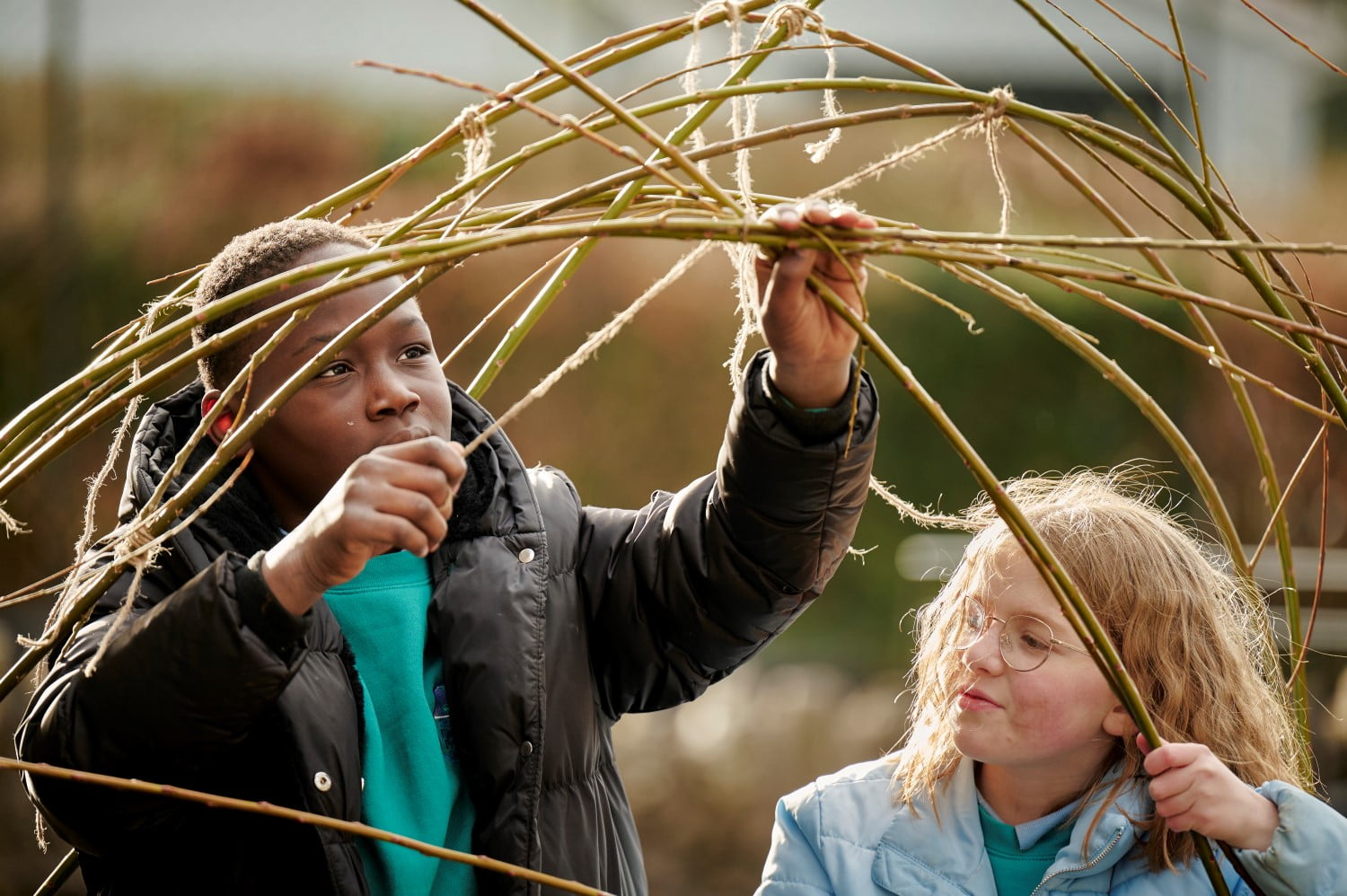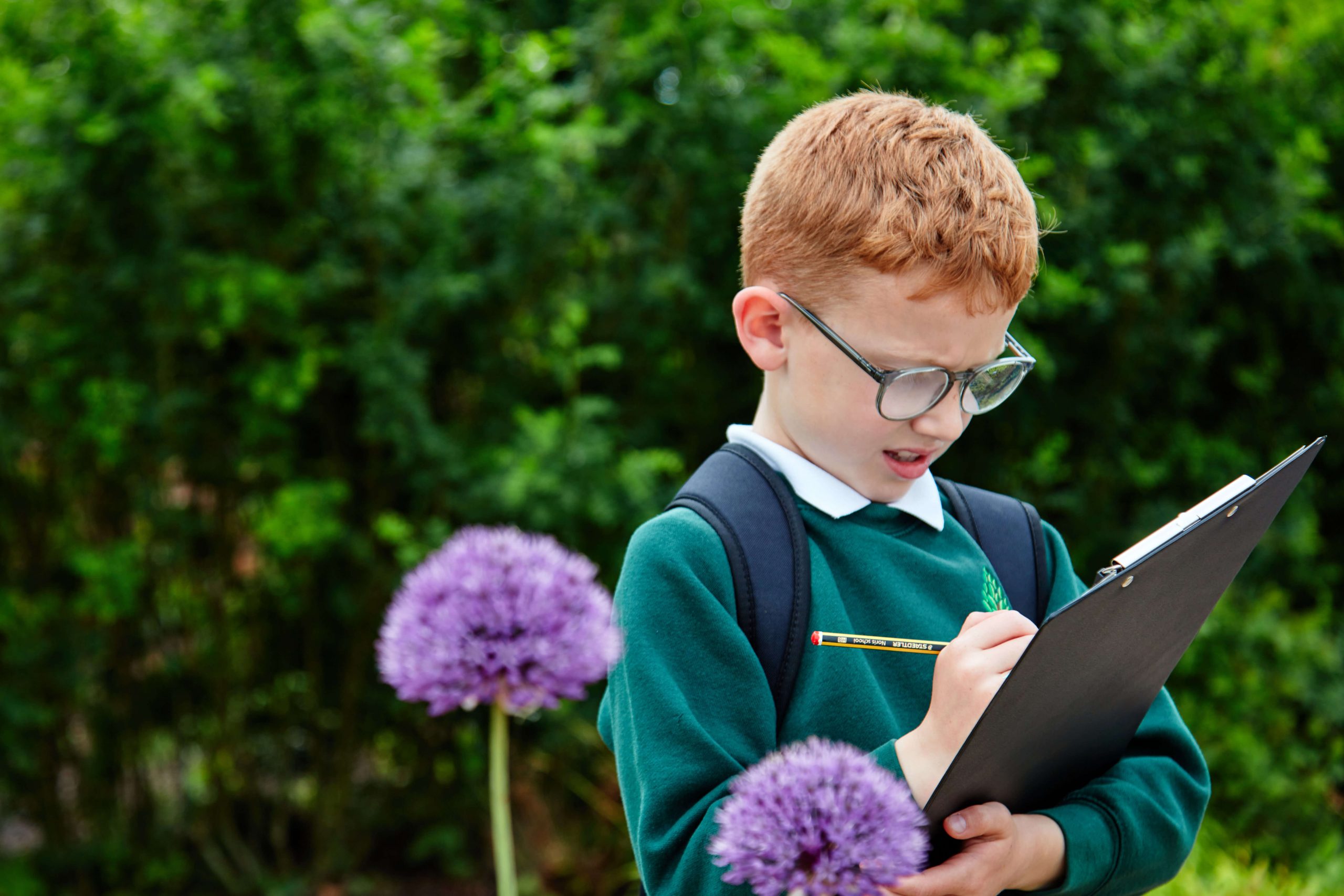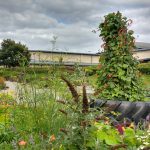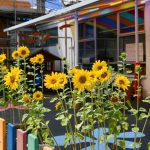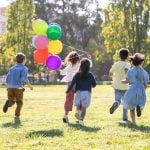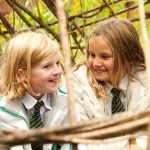2023 Year in Review: Bringing Climate Education to the Forefront
Our CEO, Carley Sefton, reflects on the new beginnings brought by 2023 and looks ahead to the future of climate education.
It is very odd writing my end-of-year blog post in 30-degree heat, surrounded by the bustle of COP28. I am here in Dubai to announce that Learning through Landscapes (LtL) is the proud new guardian of the Outdoor Classroom Day campaign. After being involved in the campaign for a decade, we are delighted it has found its home with us. With over 12 million children engaged in Outdoor Classoom Day so far, we are keen to see how it can become a key platform for resources and lessons from around the world as we take the campaign forwards.
This exciting news about Outdoor Classroom Day is a fantastic way to close out 2023, a year that has been a mix of highs and lows for LtL. At the start of the year, our film, ‘Building’ Confidence Through Outdoor Learning, was shortlisted in the 2023 Smiley Charity Film Awards. Shining a light on some great work funded by the John Laing Charitable Trust, this brilliant film captured the amazing boys at the Polygon School in Southampton as they built a storytelling throne for their school grounds.
However, 2023 also brought the end of our last Erasmus+ projects, along with the full realisation that Brexit has really happened. I was lucky enough to take my first group on an Erasmus exchange to Istanbul 10 years ago. These experiences were life-changing for many children, especially those who had not travelled before, and so many will miss out on the amazing opportunities that being part of the EU brings. After a number of wonderful projects, including Natural Nations and Social Emotional Learning which ended in 2023, we will miss working with our brilliant partners and learning so much from them.
Creating school grounds for a changing climate
The big narrative of this year has been our changing climate. For the first time, some members of our team have been affected first-hand by flooding, and we have had to issue guidance on heat in school grounds. Almost every project and every conversation I’m having with funders and partners involves discussions about what we are doing to support schools in this area.
This autumn, we launched our Climate Ready School Grounds resources in partnership with Architecture & Design Scotland, marking a strong start to our ongoing climate work. Created to help schools adapt their outdoor spaces to mitigate the impacts of climate change, the surveys and workshops engage the wider school community in identifying and addressing issues in the school grounds. We are overwhelmed with the positive reactions to the film that went alongside it, voiced by the wonderful tones of ex-board member and long-term supporter, The Real David Cameron.
Putting a focus on climate education
One of the issues we face in this changing landscape is, how do we know what quality climate education and resources look like? Climate science is complex, climate politics are complex, climate solutions are complex. So, distilling a world of conflicting information into something suitable for each stage of education, from the early years to the end of schooling, is complex!
That’s why we were delighted to receive funding to look deeply at the work we are producing in this area over the next three years. Climate School 180 aims to develop a better understanding of how schools can implement quality climate education, working in partnership with the University of Stirling and Climate Adaptive Pathways in Education (CAPE) to challenge our thinking and ensure that the whole LtL team can confidently call themselves climate education experts.
This work will support our approach across all of our projects, including our role in the Department for Education’s National Education Nature Park, which was launched by Baroness Barran at the beautiful RHS Bridgewater earlier this year. Though outdoor learning, play, and school grounds remain the heart of what we do at LtL, climate is at the core of much of our work moving forward, and we will use our 33 years of knowledge and expertise to make sure we are supporting educators in every way we can.
Looking ahead to 2024
So, as LtL embarks on an almost unplanned journey in response to educators’ requests for more support on climate change, how do I feel about 2024?
In some ways, being at COP28 has been the perfect finish to 2023, because being surrounded by climate conversations for 10 days really makes you focus on what matters. For me, the highlight of the event was the launch of the Alana and UNICEF films that LtL proudly helped to fund. Seeing our little logo on the big screen in front of ministers and dignitaries from around the world brought a tear to my eye, but it’s what the children say in those films that upset me most. It feels like there is such a disconnect between children and how they see ‘adults’, like we are the barrier to the world they want to see.
This is the role that teachers and educators must fill. Outside of family, we are the adults that children share the closest relationships with. I hope we are the people they trust to provide them with knowledge, emotional support, and inspiration. When it comes to climate education, we must be the voice to change their view of ‘adults’ — to explain the difference between scientists and politicians, to provide the tools they need to take climate action, to give them agency, but also to give a voice to the millions of children and young people who are engaged in the conversation about climate change. So, to repeat what I wrote for our annual report:
The significance of climate education cannot be overstated in today’s world. As our planet faces unprecedented environmental challenges, equipping our future generations with a deep understanding of climate change and its consequences is crucial. Climate education not only grows awareness of the natural world but also empowers individuals to learn to make informed choices as they grow up. It inspires critical thinking, problem-solving, and innovation, essential skills for addressing the most complex issues we face.
But most importantly, climate education is a call to collective action, encouraging pupils and their teachers to work together to become responsible stewards, advocating for sustainable policies, and creating positive change in their school grounds. In an era where the fate of our planet is intertwined with human knowledge and action, climate education must be at the heart of a sustainable and resilient future.
As I sit here surrounded by the energy of COP28, including all the good and all the bad this event brings, I have never been more determined that LtL has a key role to play in making sure that all teachers and educators feel supported, equipped and, most of all, celebrated for the crucial role we play in tackling the climate crisis.
What Learning through Landscapes achieved in 2023
To wrap up the year, let’s take a look back at 2023 in a few key numbers:
- 725 — the number of schools and early years settings awarded a Local School Nature Grant, helping thousands more children to enjoy the benefits of outdoor learning and play.
- 4 — the number of workshops launched through the Climate Ready School Grounds project, alongside extensive guidance on the six technical areas, a range of case studies, and a whole host of lesson ideas!
- 1000+ — the number of schools and early years settings registered with the National Education Nature Park, over 300 of which have marked their sites on the map!
- 20 — the number of blog posts we published over the course of the year, including our ‘Ask Educators’ series which covers why you should try outdoor learning in 2024, top tips for teaching outdoors in any setting, and key advice for taking learning outdoors across early years, primary, and secondary.
- 1 — the position Outdoor Classroom Day reached in the United Kingdom trends on X in May 2023!
- 50+ — the number of free resources launched through the Natural Nations project, helping schools across Europe to boost biodiversity in the school grounds!
- 10 — the number of free curriculum-led outdoor lesson ideas we shared in 2023, with more to come ahead of the New Year!
We can’t wait to see what 2024 brings. Make sure to sign up to our newsletter to stay up to date with the latest news on outdoor learning and play, and we’ll see you next year!



